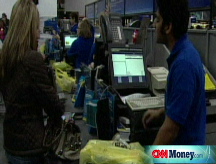Pricing in a jobs apocalypse
Stocks tumbled after bleak jobs reports Wednesday but they didn't get crushed. It could be a sign that investors are slowly but surely getting used to bad news.
NEW YORK (CNNMoney.com) -- There is no way around it. This is the worst job market in years and it's going to get even tougher.
Alcoa (AA, Fortune 500) announced Tuesday it was eliminating 13% of its global workforce. Payroll-processor ADP (ADP, Fortune 500) said Wednesday morning that 693,000 private-sector jobs were lost in December, raising fears of an equally bleak, if not even more grim, employment report from the government on Friday morning.
And to cap that all off, the Federal Reserve revealed Tuesday in the minutes from its last meeting that many Fed members expect unemployment to rise "significantly" into 2010.
With this in mind, it's not surprising that stocks fell hard Wednesday morning. But the initial sell-off -- about 2% -- was tamer than might have been expected. It wasn't one of those Acapulco cliff-dive drops that were routine back in September and October.
"It's hysterical that a 2% down day seems pretty good. But we've been immunized because some of the bigger moves in the past few months," said Paul Nolte, director of investments for Hinsdale Associates, a money-management firm based in Hinsdale, Ill.
Stocks took a turn for the worse as the day progressed though. The Dow finished Wednesday down 2.7% and the S&P 500 and Nasdaq each gave up about 3%.
Still, other market experts suggested Wednesday that the lack of a truly bloodcurdling plunge could be a sign that investors are finally getting used to the fact that this is going to be a long, painful recession.
"My guess is that most people who were going to sell have already done so. I don't see a lot more en masse selling," said Phil Dow, director of equity strategy for RBC Capital Markets in Minneapolis.
This doesn't mean that the stage is set for a major rally anytime soon. Dow said that many average investors he talks to are still "scared to death" and looking to avoid risk.
But he said there does seem to be a growing sense that stock prices now adequately reflect the gloom-and-doom to come.
"Within the framework of 2008's huge decline, stocks are still trading in the deep end of despair. When we look back, we will view this as a historical buying opportunity," he said.
Jason Tyler, director of research operations for Ariel Investments, a money-management firm based in Chicago, agreed that investors are slowly but surely coming to grips with the weak economy. For this reason, he doesn't expect stocks to get whipsawed around as sharply as they did last year.
"Volatility is down dramatically and coming back to normal levels," Tyler said. "People had no idea how to price anything in the fourth quarter. But emotional uncertainty leading to dramatic price changes has mostly abated."
In fact, Tyler said he thinks that the market is already factoring in the likelihood of the unemployment rate rising above 8% in the next few months. The unemployment rate was 6.7% in November and economist expect that it hit 7% in December.
"The market has priced in a pretty bearish employment picture," he said. "As companies look at what the holiday season was like, there is not a case to invest and hire and spend. Businesses are still looking heavily at layoffs and managing to reduce expenses."
Along those lines, Nolte said fourth-quarter earnings for many companies will probably be terrible as well. Businesses have already been preparing investors for bad results.
According to several reports, Bank of America (BAC, Fortune 500) CEO Ken Lewis said in an internal memo Tuesday that the bank's results for 2008 would be worse than expected. And on Wednesday, semiconductor giant Intel (INTC, Fortune 500) and media firm Time Warner (TWX, Fortune 500), the parent company of CNNMoney.com, both lowered fourth-quarter forecasts.
Nolte predicts that the combination of more bad economic news and weak corporate profits will probably lead to a rough start for stocks this year. But he thinks that investors will eventually look past the unrelenting tide of negative headlines and prepare for the possibility of a rebound.
"There will be impatience about the economy turning around but what's going to happen over the course of the year is there will be a divergence between the markets and economy," he said. "The economy probably won't recover until early 2010 but stocks could start to rally as investors anticipate the recovery."
And one market strategist said that while it's probably premature to say the worst is definitely over for stocks, the economic news will have to be truly scary to justify another major plunge.
"The market is prepared for trillion dollar deficits, a Hail Mary stimulus package and rising unemployment. It will take some pretty grim data to send stocks back to the lows from last October," said Chip Hanlon, president of Delta Global Advisors, an investment advisory firm in Huntington Beach, Calif. ![]()



